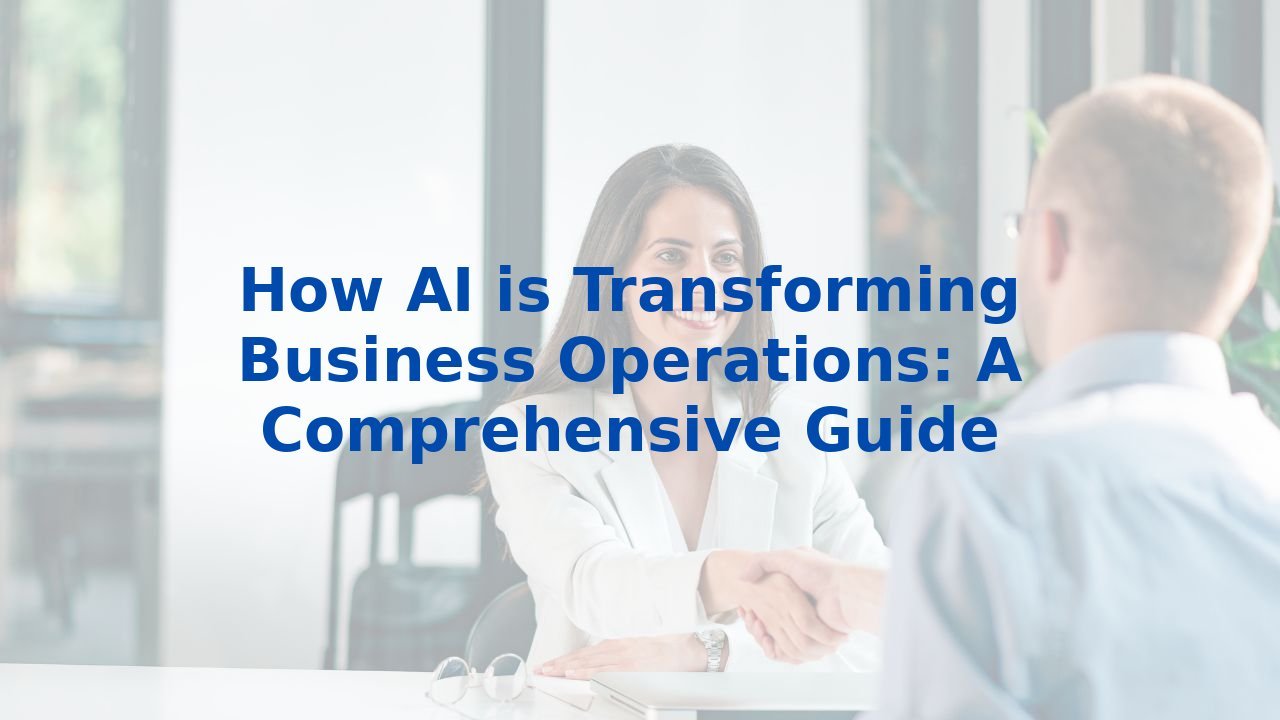How AI is Transforming Business Operations: A Comprehensive Guide
How AI is Transforming Business Operations: A Comprehensive Guide
Artificial Intelligence (AI) has emerged as a game-changer in the landscape of modern business, influencing various operational processes and enhancing organizational efficiency. As companies embrace AI, it's crucial to understand how this technology can be leveraged to transform business operations. This guide dives deep into the core areas where AI offers significant advantages and explores the necessity of training employees to harness its full potential.
1. AI and Administrative Duties
The realm of administrative duties is undergoing a profound transformation through AI integration. Administrative tasks, traditionally a drain on managerial resources, are now being automated, allowing leaders to focus on strategic decision-making. For instance, AI can efficiently handle report generation, scheduling, and data comparisons, enabling businesses to save valuable time and ensuring accuracy. In sectors like manufacturing, AI identifies defective products on production lines, not only eliminating inefficiencies but significantly enhancing product quality.
2. AI in Hiring Practices
Recruitment processes have traditionally been labor-intensive, often leading to prolonged hiring cycles. AI technology streamlines this process by filtering applications based on preset criteria—reducing time and effort spent on the initial phases of hiring. Moreover, by analyzing candidate behavior and compatibility through simulations, AI assists organizations in making informed hiring decisions, guaranteeing a better fit with company culture. The result? A faster, more efficient hiring process coupled with higher-quality talent acquisition.
3. AI and Job Evolution
With AI's capabilities expanding, business leaders are rethinking job roles rather than viewing AI as a replacement for human labor. The technology often augments existing roles, creating opportunities that prioritize human creativity and intuition. For example, in customer service, AI can anticipate customer needs and resolve issues proactively, elevating the overall customer experience. This shift frees employees to engage in higher-value tasks, leading to enhanced job satisfaction and productivity.
4. AI in Business Operations
AI's role in accelerating innovation is notable. It empowers organizations to enhance accuracy across design, production, and development cycles. AI-driven data analytics unearth meaningful insights from large datasets, facilitating better strategic planning, optimizing resource allocation, and enhancing risk management. Additionally, through personalized customer experiences, AI adapts to individual preferences, providing timely and accurate interactions that resonate with customers, thereby driving loyalty and engagement.
5. AI in Customer Service and Data Management
Customer service sees a revolution with the integration of AI chatbots that not only manage inquiries but also optimize internal operations. These chatbots can handle routine tasks, managing calendars and emails, which allows human resources to focus on critical business strategies. Furthermore, AI systems can analyze vast quantities of data to highlight patterns in customer behavior—enhancing decision-making and the overall user experience.
Benefits of AI for Improving Efficiency
Adopting AI across business operations yields immense benefits:
- Increased Efficiency: Automation of repetitive tasks allows human resources to tackle strategic responsibilities.
- Enhanced Decision-Making: AI's rapid analysis of data offers actionable insights, driving informed choices.
- Personalized Customer Experience: Tailored interactions foster customer satisfaction and engagement.
- Improved Security: AI's ability to detect cybersecurity threats enhances data protection and prevents fraud.
Importance of Training Employees for AI
While the benefits of AI are clear, the successful adoption of this technology hinges on effective employee training. Here’s why:
- Understanding AI Capabilities: Equipping employees with knowledge about AI functionality enhances its integration into everyday workflows.
- Maximizing Human-AI Collaboration: Training promotes synergy between human insight and AI efficiency, optimizing outcomes.
- Adapting to New Roles: As AI transforms job duties, ongoing training ensures employees can adapt seamlessly to new responsibilities.
- Enhancing Skills: Training programs cultivate essential skills that complement AI, such as strategic thinking and data analysis.
Embracing AI is not merely about technology; it's about people. Training employees to harness AI's capabilities can transform organizations into innovative powerhouses, ready to meet the challenges of our dynamic business landscape.
Conclusion
AI is not just a trend; it's a fundamental shift in how businesses operate. By automating administrative duties, enhancing hiring practices, evolving job roles, and improving efficiency, AI redefines operational success. Investing in employee training is equally essential, ensuring that organizations not only embrace AI but also thrive with it. The journey to transformation starts now, propelling businesses into a future filled with possibilities and growth.
For organizations eager to equip their workforce with the necessary AI skills, exploring AI Training & Certification for your entire Organisation can be a pivotal step towards achieving peak operational efficiency.



